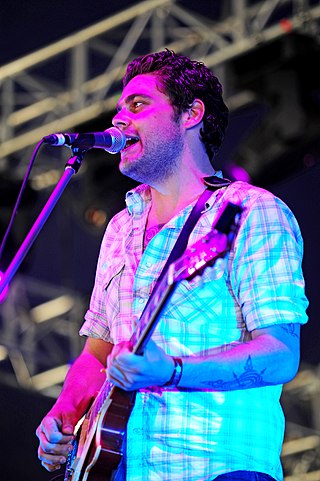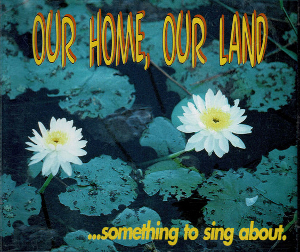
Paul Maurice Kelly is an Australian rock music singer-songwriter and guitarist. He has performed solo, and has led numerous groups, including the Dots, the Coloured Girls, and the Messengers. He has worked with other artists and groups, including associated projects Professor Ratbaggy and Stardust Five. Kelly's music style has ranged from bluegrass to studio-oriented dub reggae, but his core output straddles folk, rock and country. His lyrics capture the vastness of the culture and landscape of Australia by chronicling life about him for over 30 years. David Fricke from Rolling Stone calls Kelly "one of the finest songwriters I have ever heard, Australian or otherwise". Kelly has said, "Song writing is mysterious to me. I still feel like a total beginner. I don't feel like I have got it nailed yet."

Comedy is a double album recorded by Paul Kelly & the Messengers and originally released in 1991. It peaked at No. 12 on the ARIA Albums Chart and remained in the top 50 for 12 weeks. Comedy reached the top 30 on the New Zealand Albums Chart.

Hidden Things is an album by Australian folk rock group Paul Kelly & the Messengers released in March 1992 on Mushroom Records, which reached No. 29 on the ARIA Albums Chart. It also reached the Top 40 on the New Zealand Albums Chart. It is a collection of tracks recorded by Kelly and both his backing bands, the Coloured Girls and the Messengers, from 1986 to 1991, but were not issued on previous studio albums. The album spawned a single, "When I First Met Your Ma", which was released in March. Messenger band members provide lead vocals on "Hard Times" from its writer Steve Connolly, "Rock 'n' Soul" from its writer Jon Schofield. "Sweet Guy Waltz" is a slower version of "Sweet Guy" which was on 1989's So Much Water So Close to Home. The album was re-released in 2011 as Hidden Things: B-sides & Rarities.

John Charles Wiltshire-Butler, professionally known as John Butler, is an American-Australian singer, songwriter, and music producer. He is the front man for the John Butler Trio, a roots and jam band that formed in Fremantle, Western Australia, in 1998.
Kaarin Louise Fairfax is an Australian actress, director and singer who played the role of Dolour Darcy in two TV miniseries, The Harp in the South (1986) and its sequel Poor Man's Orange (1987), based on books of the same names by Ruth Park.
Alice Miriam Olivia Garner is an Australian actor, author, musician, teacher and historian.

Static & Silence is the third and final studio album by English alternative rock band The Sundays, released in the UK by Parlophone on 22 September 1997, and in the US by Geffen on 23 September 1997. The title is a quote from the album's final track "Monochrome", and the album's cover photo is a reference to the subject of "Monochrome", the TV screening of the Apollo 11 Moon landing.

Ruby Charlotte Margaret Hunter, also known as Aunty Ruby, was an Aboriginal Australian singer, songwriter and guitarist, and the life and musical partner of Archie Roach.
Kevin Daniel Carmody, better known by his stage name Kev Carmody, is an Aboriginal Australian singer-songwriter and musician, a Murri man from northern Queensland. He is best known for the song "From Little Things Big Things Grow", which was recorded with co-writer Paul Kelly for their 1993 single. It was covered by the Get Up Mob in 2008 and peaked at number four on the Australian Recording Industry Association (ARIA) singles charts.

"From Little Things Big Things Grow" is a protest song recorded by Australian artists Paul Kelly & The Messengers on their 1991 album Comedy, and by Kev Carmody on his 1993 album Bloodlines. It was released as a CD single by Carmody and Kelly in 1993 but failed to chart. The song was co-written by Kelly and Carmody, and is based on the story of the Gurindji strike and Vincent Lingiari as part of the Indigenous people's struggle for land rights in Australia and reconciliation.
John Henry Romeril is an Australian playwright and teacher. He has written around 60 plays for theatre, film, radio, and television, and is known for his 1975 play The Floating World.
The APRA Music Awards in Australia are annual awards to celebrate excellence in contemporary music, which honour the skills of member composers, songwriters, and publishers who have achieved outstanding success in sales and airplay performance.
Charles Lothian Lloyd "Charlie" Owen is an Australian multi-instrumentalist and producer. He has been a member of The New Christs (1987–90), Louis Tillett and His Cast of Aspersions (1990), Tex, Don and Charlie, Tendrils (1994–99) and Beasts of Bourbon. His solo album, Vertigo and Other Phobias, was released in 1994 on Red Eye/Polydor.

Daniel Leo Sultan is an Australian alternative rock singer-songwriter and guitarist, actor and author. At the ARIA Music Awards of 2010 he won Best Male Artist and Best Blues & Roots Album for his second album, Get Out While You Can. At the 2014 ceremony he won Best Rock Album for Blackbird, which had reached number four on the ARIA Albums Chart. In 2017, Sultan's record Killer was nominated for three ARIA awards: Best Male Artist, Best Rock Album, and Best Independent Release. Sultan's debut children's music album Nali & Friends was named Best Children's Album at the ARIA Music Awards of 2019.
David Arden is an Australian singer-songwriter and Aboriginal activist. is a Kokatha and a Gunditjmara Songman. He has performed with Archie Roach, Ruby Hunter, Tiddas, Bart Willoughby, Mixed Relations and with members of Shane Howard, Paul Kelly, Not Drowning Waving and Hunters and Collectors. He was a founding a member and co Musical Director of The Black Arm Band.
The Eighth Australian Recording Industry Association Music Awards was held on 30 March 1994 at the State Theatre in Sydney. Radio and TV personality Richard Stubbs hosted the ceremony and was assisted by presenters to distribute 26 awards.

StalkHer is a 2015 Australian romantic comedy thriller film directed by John Jarratt and Kaarin Fairfax – both also star in the film.

Death's Dateless Night is the 22nd studio album by Paul Kelly and is a collaboration with fellow Australian musician, Charlie Owen, which was issued via Gawd Aggie/Universal Music Australia on 7 October 2016. It was co-produced by Kelly, Owen and J. Walker, which peaked at No. 16 on the ARIA Albums Chart. It was nominated for Best Blues and Roots Album at the ARIA Music Awards of 2017.

Our Home, Our Land is a compilation album released in Australia by CAAMA in 1995. It was released to celebrate the victory in the Mabo case. It focused on the importance of land to the Aboriginal and Torres Strait Islander beliefs. It was nominated for a 1996 ARIA Award for Best Indigenous Release.











